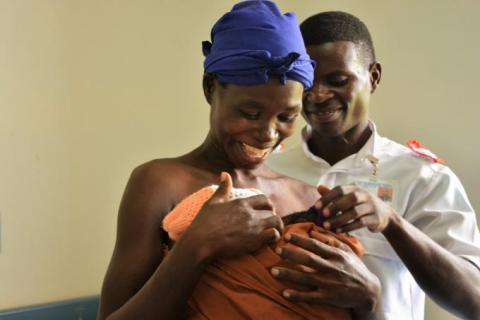Every Life is Precious: Becoming an advocate for quality care for newborns in Malawi

Chrissy Antonio holds her premature twins in the KMC position. Born less than 1500 grams each, the babies were released from the unit five days after delivery.
Before coming to Malawi I would never have guessed I would become an advocate for babies.
For most of my life, I have been unnerved by babies — by their vulnerability, small and fragile bodies and their inability to articulate what’s wrong, beyond an indiscernible cry. It may be a silly fear, but it is a very real one.
Now as I approach my 30’s, babies are everywhere. Every time I log into Facebook I see babies — babies in costumes, babies with dogs, babies in the bathtub. Living in Malawi as a Global Health Corps fellow with Save the Children, I see babies touted around on their mother’s backs, breastfeeding next to me on the bus, and sadly, laying in hospital cots fighting for their lives.
I recently began working with Save the Children’s Saving Newborn Lives project, an initiative working to achieve equitable and effective coverage of high-impact newborn services and practices institutionalized at scale. More simply put, the project aims to ensure all babies are given the chance to survive and thrive.
Unfortunately, ensuring a baby’s survival isn’t that easy in Malawi, a country with the highest preterm birth rate in the world — 18 per 100 live births. When a baby is born prematurely here, their chances of survival significantly decrease because of cultural, economic and structural factors including hospitals’ limited capacity — human resources and equipment — to manage “difficult” cases. As a result, direct complications of preterm birth are the second leading cause of child death in Malawi and 14 newborns die each day, many from preventable and treatable conditions. That’s 14 lives that may have been saved if quality health care was accessible.
I recently visited Thyolo District Hospital located in the southern region of Malawi. I distinctly remember standing over the wooden cot of a newborn premature baby. Just hours old, her bones protruded from her body and her chest aggressively pumped every breath with exhausting difficulty. I watched her face crinkle in pain and it broke my heart to wonder, will she survive? That same day I met Mrs. Silika, a primary schoolteacher who told the story of her premature twins dying as a result of inadequate supply of oxygen concentrators. She was confident that had there been equipment and better trained staff in 2014, her twins could have been saved. Mrs. Silika’s devastating and frustrating experience is a story I’ve heard from many other mothers in Malawi.
It’s time for this to change. And it will.
This February, health leaders from nine countries met in Malawi for the World Health Organization (WHO) Quality of Care Network launch, which focuses on achieving quality, equity, and dignity for all. The Network will focus on promoting quality healthcare within facilities for everyone, everywhere. For newborns, this means training health providers to manage sick and small infants and ensuring health facilities are properly equipped to manage all of the cases.
Thyolo District Hospital has already proven the effectiveness of this approach. In 2014, the Ministry of Health, with the support of Save the Children, began implementing a quality improvement initiative in the hospital including ongoing mentorship and refurbishment to create a functional neonatal care unit. Previously, all babies had been kept within the maternity ward and were often left untreated resulting in high rates of neonatal mortality — 41 deaths per 1,000 live births in 2014.
Now, the Thyolo District Hospital has a functional neonatal unit with a separate space dedicated to Kangaroo Mother Care. Passionate and trained staff are allocated solely to the babies and every life, regardless of size, is counted and valued.
Thyolo District Hospital is proof that it is possible to improve the quality of care for small and sick babies, but it requires commitment. It requires an investment. And it requires people standing up to advocate for the smallest and most vulnerable individuals who cannot yet speak for themselves.
The global health community continues talking about progress toward achieving the Sustainable Development Goals (SDGs), including the target for ending preventable newborn deaths, but if we don’t do more now, newborns like Mrs. Silika’s twins will continue to die unnecessarily.
Yes, six months ago I would have laughed at the idea that “I” would become an advocate for newborn lives. But now? Now I am proud to be part of a coalition holding governments accountable to their commitments toward improving newborn care.
Because every life is precious, and every baby deserves a chance.
Learn more about the work being done to reduce neonatal mortality in Malawi and watch this video further highlighting the progress made in Thyolo District Hospital.
Written by Alicia Adler, Programme Officer-GHC Fellow
 Malawi
Malawi